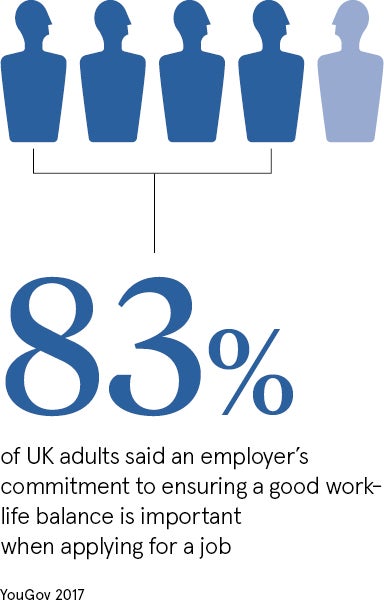Germany’s largest union is threatening strike action if demands for a better work-life balance are not met. Last year IG Metall asked for shorter working hours and a 6 per cent pay rise for a reported 3.9 million workers. Negotiations with German employers are ongoing, involving a proposed reduction in weekly working from 35 to 28 hours.
In the UK, full-time workers put in an average of 37.3 hours a week and, without the same union set-up and collective bargaining power as employees in Germany and the Nordic countries, their wellbeing is in the hands of individual employers and business leaders.
Initiatives to encourage employee engagement and workplace wellness range from flexible working to mental health support and financial or physical rewards for performance. Research suggests that such schemes can boost retention rates, reduce absenteeism and increase productivity.
A survey by YouGov suggests a lack of workplace wellness can have far-reaching side effects. Employees with a poor work-life balance tend to be more disengaged with life in general than the average person, with those aged 25 to 34 particularly at risk.
While more businesses in the UK are taking responsibility for workplace wellness, approaches vary and often lack strategy, says Rachel Suff, employment relations adviser at the Chartered Institute of Personnel and Development (CIPD). According to CIPD research, a third of the organisations surveyed had a formal wellbeing programme and fewer than half (43 per cent) of respondents said wellbeing was on senior leaders’ agendas.
 To be effective, employee engagement programmes must be reflected in and begin with a company’s culture, leadership and people management, says Ms Suff. “Senior leaders have to buy into any initiative otherwise it will fail. They’re going to set the tone for the culture of the whole organisation,” she says.
To be effective, employee engagement programmes must be reflected in and begin with a company’s culture, leadership and people management, says Ms Suff. “Senior leaders have to buy into any initiative otherwise it will fail. They’re going to set the tone for the culture of the whole organisation,” she says.
Lawrence Jones, chief executive of Manchester-based cloud computing and hosting company UKFast, has put employee wellbeing at the heart of his businesses. Initiatives include childcare provision, flexible working to accommodate families and personal milestones, an on-site gym and a financial reward for ten years’ service.
As a business grows, senior management can become removed from the front line, making it more difficult to understand employees’ individual engagement and wellbeing needs, says Mr Jones. This makes it imperative for leaders to create a culture where employee ideas are listened to and acted on.
“As a leader, it’s very easy to block great ideas, but if you create the right environment, the teammates will build the culture,” he says, adding that the best wellbeing initiatives have come from within UKFast.
Experts agree that a commitment to employee health and happiness needs to go beyond lip service from senior management. Employees need autonomy and the chance to have a say in how they do their work, says Adrian Wakeling, senior policy adviser at employment advice service ACAS.
“The things that really matter to employees are not slightly generic concepts about engagement, which have become a bit theoretical. The key ingredient of good employee relations is communication – there’s been a shallowing of genuine consultation in the workplace,” says Mr Wakeling.
Senior management can help HR teams advocate for engagement by both promoting what’s available and showing real commitment. If flexible working is offered, executives should be seen to take it up, for example.
At UKFast, employee wellbeing is supported at all levels, from the company’s leadership to its line managers, whose teams are purposefully limited in size to enable easier communication and more support for employee wellbeing. Engagement and wellness are not left to HR.
“We don’t have an HR department. If you get the right people in and create the right environment, you’d be better off with a director of happiness than an HR director. It would be more proactive than reactive,” says Mr Jones.
The key ingredient of good employee relations is communication – there’s been a shallowing of genuine consultation in the workplace
HR can play an important role in employee wellbeing if its focus isn’t just policy and procedure, but people, says Mr Wakeling. Too much emphasis on compliance, especially when HR teams are downsized or centralised, rather than on people and how they interact with each other can undermine genuine engagement.
Marc Coleman, founder and chief executive of HR network and conference firm UNLEASH, says human resources must return to its roots in organisational design to support workplace wellness effectively. Too often HR teams are expected to set company culture, drive employee engagement and lead recruitment, all of which HR can help enable, but which should be shared responsibilities, he says.
While Germany’s unions fight on employees’ behalf, in the UK the government could do more to support employee wellbeing by increasing tax allowances for training and introducing allowances for schemes to motivate employees, says Mr Jones.
UK business leaders would do well to look further afield when it comes to employee wellness, adds Mr Coleman. Countries, such as Germany and Sweden, discussing or introducing shorter working to promote a better work-life balance and protect employees’ health are also planning for the future.
“There are bigger problems at the moment,” says Mr Coleman. “Look at the high levels of youth unemployment in southern Europe or the automation that’s coming through, which means jobs aren’t going to be there. These countries are preparing for what’s coming.”






